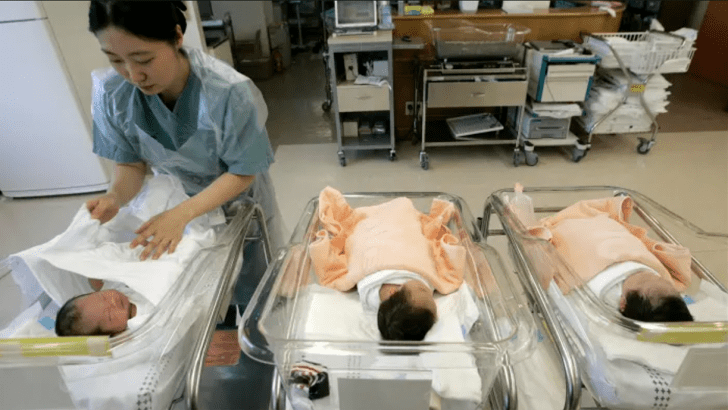And so Irish fertility figures continue to fall: statistics just announced from the Central Statistics Office (CSO) disclose that there were more deaths than births in the first quarter of 2021.
Pattern of decline
Births were down by 476, a fall of 3.3% from the first three months of 2020. This is all part of a continuing pattern of decline: in 2020, births had decreased by 3,837 for the whole year compared with the previous year of 2019, and in 2019 births were down on that previous year from 2018.
In 2021, one-third of births were outside of marriage. Last year, there were also 153 infant deaths, which is 2.7 live births. Back in the 1990s, Ireland had reached the enviable standard of zero deaths of new-borns.
In the first quarter of 2021, there were more deaths, overall, than births in Ireland, deaths having risen by ten per cent compared to the same period in 2020. The leading causes of death were cancer and circulatory illness. Covid-19 accounted for 19%.
Everyone has to depart this world, so death is a natural process, although naturally none of us want to go before our time. But the decline in births is unlikely to be a natural process: it is evidently down to the control of fertility, one way or another. The average age for Irish mothers giving birth for the first time is just over 33, which indicates a planned deferral of parenthood.
This occurs for a number of reasons, including problems of housing – which is why the provision of homes is a family issue. Support for the family must mean support of housing for those hoping to have families.
Yet the American economist and Nobel laureate Gary Becker also suggested – somewhat uncomfortably, perhaps – that one of the reasons for the decline in fertility is an obsession with education.
Examples
The East Asian nations are examples of this: they have extremely low fertility – Japan with 1.36 births per woman, China with 1.3 and South Korea with O.84. Dr Becker’s theory was that these nations put such a high value on education – extra tutoring for Japanese children means “cram schools” after regular school – that parents often reckon they can’t afford more than one child.
The nations with the top maths scores for youngsters – China, Singapore, Hong Kong, Japan, South Korea – all have falling fertility. The European country with the top Maths score is Estonia – whose tiny population is falling, and whose birth rate is 1.07 per woman.
Education is great, but continually falling births means a stagnation from which no maths champion can rescue a nation.
Bound by faith
Sir David Goodall’s memoir The Making of the Anglo-Irish Agreement of 1985 reveals how Garret Fitzgerald charmed, coaxed and cajoled Margaret Thatcher into signing the Anglo-Irish Agreement, although it really went against her own unionist instincts. Sir David, a senior British civil servant, was a huge influence in getting Maggie to the table (along with Lord Armstrong, private secretary to the PM), a measure which led to a newly positive phase in British-Irish relations, and eventually the Good Friday Agreement.
David Goodall, who died in 2016 aged 84, has been much praised for his consistent dedication to this cause, though it is seldom mentioned that his Catholic Faith was a significant part of his work and the ethos of integrity he brought to his public service. His paternal grandparents were from Wexford and he had a lifelong interest in Irish genealogy. He was educated by the Benedictines at Ampleforth.
Although he retained a civil servant’s discretion in politics, he was certainly pro-life: I once heard him speak on the issue with sincere commitment.
***
Discussion about face-masks for children continues, but another coronavirus-based theme for the autumn will surely be ventilation. The boffins have been saying for months that fresh air and ventilation are crucial to halting the virus – maybe more vital than hand-washing, and space-observing (the theory that the virus is transmitted on surfaces has fallen out of favour).
So ventilation – which disperses the virus particles – will be the autumnal emphasis. As the winter approaches, we may have to endure open windows in any enclosed space, be it public transport, café, pub or church. This is all to the good, and those of us who attended convent school back in the tough old days will, hopefully, be able to call on those inner resources of facing the bracing draughts bravely and ‘offering it up’.
Modern life has probably become too mollycoddling, what with stuffy central heating and unhealthy air conditioning. A blast of cold, fresh air will deter the virus, keep our brains alert – and, as Reverend Mother would remind schoolgirls of old – build character and ‘backbone’ as well!


 Mary Kenny
Mary Kenny
